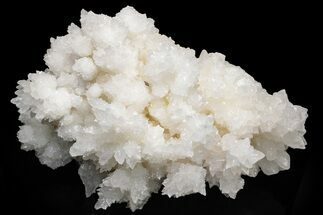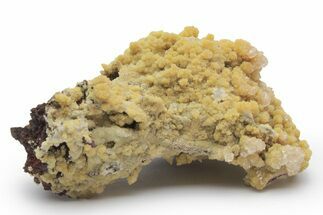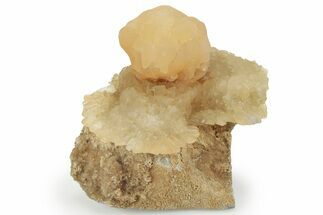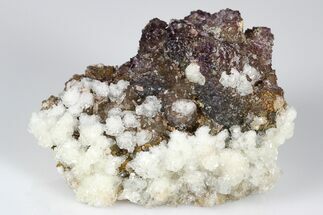This Specimen has been sold.
4.8" Lustrous, Cave Calcite (Aragonite) Formation - Potosi Mine, Mexico
This is a gorgeous cluster of lustrous calcite/aragonite (cave calcite) that was collected from the Potosi Mine in Chihuahua, Mexico. Under short wave UV, the underside of this specimen fluoresces vibrant green.
It comes with an acrylic display stand.
It comes with an acrylic display stand.
Cave calcite is not actually calcite but a formation of aragonite crystals. Calcite and aragonite are both carbonates with the same chemical formula (CaCO3), but different crystal structures and symmetries.
Cave calcite forms underground due to groundwater deposition. While it often forms stalactites and stalagmites on cave ceilings and floors, it can also form as unique, branching, tree-like structures. These beautiful formations are sometimes known as ‘floss ferri’ (flowers of iron) and frostwork.
The massive Potosi Mine at Santa Eulalia, Mexico produces some really fascinating cave calcite formations. The mine is primarily worked for silver, lead, zinc, and copper. A characteristic feature of the ore deposits found within Mexico's Cretaceous limestones is the presence of caves in close association to them.
In 1912 miners broke into the first underground cavern containing amazing cave calcite formations. Additional caverns have been discovered over the decades during mining operations. Luckily collectors have been able to recover some of this material before mining operations destroy these caverns.
Cave calcite forms underground due to groundwater deposition. While it often forms stalactites and stalagmites on cave ceilings and floors, it can also form as unique, branching, tree-like structures. These beautiful formations are sometimes known as ‘floss ferri’ (flowers of iron) and frostwork.
The massive Potosi Mine at Santa Eulalia, Mexico produces some really fascinating cave calcite formations. The mine is primarily worked for silver, lead, zinc, and copper. A characteristic feature of the ore deposits found within Mexico's Cretaceous limestones is the presence of caves in close association to them.
In 1912 miners broke into the first underground cavern containing amazing cave calcite formations. Additional caverns have been discovered over the decades during mining operations. Luckily collectors have been able to recover some of this material before mining operations destroy these caverns.
SPECIES
Aragonite
LOCATION
Potosi Mine, Santa Eulalia Distract, Chihuahua, Mexico
SIZE
4.8 x 4.1"
CATEGORY
SUB CATEGORY
ITEM
#165295
 Reviews
Reviews













